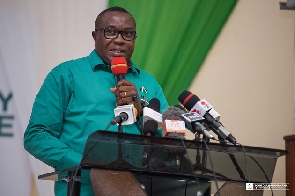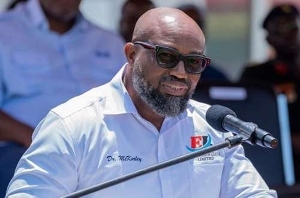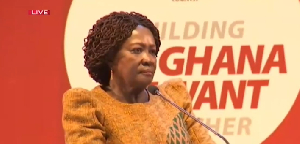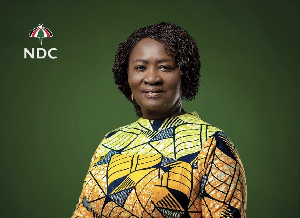 Ursula Owusu-Ekuful, Minister of Communications
Ursula Owusu-Ekuful, Minister of Communications
Mrs Ursula Owusu-Ekuful, the Minister of Communications, has cut the sod for the construction of 30 new State-of-the-Art Community Information Centres (CICs) across the country in Akyem Asuom in the Kwaebibirem District of the Eastern Region.
The Centre, when completed, will serve as a resource Centre for people living within these areas, where they can easily access internet services.
These CICs also double as community resource centres to provide business services and community development information within remote communities.
She said 100 out of the over 200 existing CICs would also be renovated and equipped with upgraded computers and other equipment.
The Minister called on the District Assemblies, MPs and the public-spirited individuals and corporate organisations to partner with government through the Fund to ensure that every underserved and unserved community in the country becomes a part of the digital society.
“If they provide the buildings and furniture, GIFEC will provide the computers and accessories and trained personnel to manage it,” she said.
Mrs Owusu-Ekuful urged the contractors executing the projects to complete all 30 CICs within six months and ‘we will be closely monitoring progress to ensure it’s done according to schedule.”
She also urged the beneficiary communities to cooperate with the contractors and workers and give them the necessary support to enable them to complete their work successfully.
“You must own the project and upon completion, ensure that this investment is protected and fully utilized for succeeding generations to derive maximum benefit from it,’ she said.
The Minister said the country has been locked in, businesses, social, economic and religious activities shut down and e-commerce, telemedicine, working from home, and other remote or virtual activities were the best means of keeping the economy alive.
Mrs Owusu-Ekuful said indeed, this period has clearly demonstrated that ICT is vital to keep everybody all safely connected.
She said some interventions provided by the Ministry which have aided in the COVID-19 response include facilitating the establishment and management of the Emergency Call Centre (112) and the National Information Contact 1 Centre (311).
Others are the Emergency Communication System and the COVID-19-19 symptom tracker App(*769#) to facilitate contact tracing and quarantine monitoring, assisting telcos to zero-rate all health and educational sites and provide daily COVID-19 alerts to all subscribers free of charge.
Mrs Owusu-Ekuful said government has also provided public sector workers with tools to facilitate remote working through the Smart Workplace platform, connecting over 200 Ministries Departments and Agencies and provided them with virtual office functionalities.
Mr Abraham Kofi Asante, Administrator of GIFEC, said the need for ICT inclusiveness could not be overemphasized; and it was for this purpose that the Fund was set up in 2004 to facilitate the provision of universal access to ICT to all persons for socio-economic development.
He said since its establishment, GIFEC has implemented several innovations to achieve its mandate.
Some of these significant initiatives include the expansion of telecommunications and data service to people living in communities with a population of less than 1,500.
Mr Asante said since 2017, GIFEC has established 400 of these sites, serving about 1,200,000 people within 2,000 communities through innovations and partnerships.
He said the digital divide was not just about connectivity, people lack the knowledge and skills they need to succeed in a digital economy.
Mr Asante said lack of skills was the greatest barrier to digital inclusion, especially for people living in unserved and underserved communities.
He said it was worthy of mention that, the United Nations Broadband Commission for Sustainable Development calls for 60 per cent of youths and adults to have a minimum proficiency in sustainable digital skills by 2025.
To achieve this goal, Mr Asante said, the Ministry through GIFEC started establishing Community Information Centres to serve as digital transformation centres within communities to build the digital capacities of the populace.
“As at 2017, only 28 out of the existing of 241 Community ICT Centres were operational,” he said.
Mr Asante said they embarked on a strategic turnaround programme that involves refurbishing and equipping the centres to make them fully functional and achieve the objective for which they were established.
He said this notwithstanding, there were many more communities that lack such community ICT hubs and were lagging behind in their quest for digital knowledge and active participants in a digital society.












